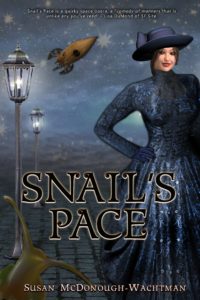…Susannah didn’t hear him. Something had just occurred to her. “Are my employers — Chinese?”
He stared at her in surprise. “No!” He sighed and swung his arms in frustration. “I thought I had made that clear. I told them you were from the wrong culture for this. No exposure to alien life. Not even a conception of other worlds.”
She heard that. “What do you mean? Are you suggesting that I have had no exposure to alien life? Just what words would you use to portray the difference between the Chinese way of life and that of an English woman? Can you not conceive that after growing up with my mother in London, Hong Kong was like another world to me?”

He snorted. “Honey, you don’t know what alien is. I told them, ‘If she doesn’t go into shock, she’ll go stark, raving crazy.’ But they didn’t listen.”
His tone annoyed her. “Are you not Chinese? From Earth?”
Chiang paused. “Well, yes. A long time ago. But please don’t tell anyone. I tell everyone I’m Maurean. Earth is considered the backwoods of the universe — it doesn’t even have a Universal Representative! I’d appreciate it if you kept my origins to yourself. If you want to be respected, you’ll adopt a new homeland, too.”
Slowly Susannah sat down on the low bed, then jumped up in shocked surprise.
“Does it live?”
“Not exactly, no,” he said absently. “Go ahead and sit on it. It won’t hurt you.
But will I hurt it? she wondered. She sat down gingerly. The bed again began a soothing purr. Trying to relax, she watched curiously as Chiang fiddled with his small box. “Would it be rude to inquire the purpose of that?”
“No.” He looked down at her with a frown. “I’m the only human on this ship besides you, Susannah.” She knew she ought to reprimand him sharply for using her name without permission, but it seemed a little inconsequential at the moment. “You can ask me anything you want to. Nothing is too rude. But you should only ask me, okay? You have no way of knowing what’s rude to any of the other creatures on board. Some of the others — oh, this is ridiculous. You don’t belong here. This –” he shook the box, “is a communicator, a translator, and several other things. And right now I’m going to communicate to the Captain and to the Family that they must take you back. They had no business bringing you out here.”
She leaped to her feet again. “You’ll do no such thing!” She grabbed his hand away from the communicator. “Who are you to make such a decision for me? To what should I return? I should go back to become a governess to a spoiled little English child? Knowing all the time that I could have been — been flying through space having extraordinary adventures instead? I will not!” She tried to soften her tone. “Please, Chiang.” She realized she was still holding his hand and blushed, dropping it. “This will not be an easy adjustment, but it will certainly be an interesting one! Please. You did it!”
“Well, I, yes, I did, but — you don’t –” He sighed. “Most women wouldn’t even have come. Why did you?”
“Well, I needed the money. I believe you know that my mother died in England.” He nodded. She suspected that he did not like looking up at her, so she sat down on the bed again. “And my father brought me to Hong Kong on his ship.” She smiled. “It was his fond wish that I meet a likely gentleman and marry, and so be secure. But, alas — Well, to tell you the truth, I was not a bit saddened when no likely gentleman appeared — a few unlikely gentlemen, but I soon sent them packing! I am afraid I have a very unladylike appreciation for travel and adventure.”
“So I’m learning.”
“Yes, well. The fact is that when my father died, I found to my dismay that the ship was not his ship at all, but belonged to the bank. He was not, I fear, much of a businessman. I had to get a job. I must admit being a governess was the last thing I wanted to do. But in my straitened circumstances, options were few.” She sighed. “It seemed that no one would hire me to do anything else.”
“You must have relatives somewhere.”
“Oh, yes, certainly.” She tried to cross her ankles, but the bed was too low to do it comfortably. “In England. It would have been six months before they even heard of my predicament and could send for me. In the meantime, I had to eat.”
“But why this job?” Chiang demanded with persistent disapproval.
“Because it paid more.” She smiled. “I knew that if I took this job, I’d eventually be able to go back to England in style, instead of as a — an orphaned old spinster, or a governess, forever dependent on others for my survival. And then, I must admit, my father was a gambler, and I may have inherited a propensity for the same.” She smiled, remembering. “He lost it all in the end, but he did have a mighty fine time. My mother always disapproved of him. He was a charming rogue, and I believe he may have misled her when he courted her. She did her best to instruct me in the art of being a lady. Which most certainly was not easy for either of us! And she attempted to instill in me a caution which I obviously lack!” She laughed. “Father taught me that to live, one must take risks!” She tossed her head back, and a few pins slipped out of her hair. Cascades of brown waves threatened to descend unchecked. “Oh, fiddle! Is there a looking glass available?” The ship seemed slightly damp; like a London fog, it was making her hair curl.
“Behind this curtain.” Chiang showed her how to hook the curtain back, displaying a blank screen. “Tap it once–” he demonstrated, “and you have a mirror. Tap it more times and you get other stuff — but I don’t think you’re ready for that yet. And behind this curtain is your tube.”
“Pardon me?!”
“For your ‘personal needs.’ The toilet. The facilities. The water closet. Only there’s no water. You’ll figure it out.”
“Oh,” she said faintly, hoping he was right. What would Mother say to this?
“They keep everything behind curtains,” he continued. “Except their thoughts.” He glanced at her sideways, causing her to become aware of his slanted eyes. Her father had called the Chinese inscrutable, she recalled. She stopped fiddling with her hair to frown at him suspiciously. Whatever could his comment indicate?
“I’ll go see if dinner is ready,” he said casually.
“What did you mean?” she demanded.
“Mean by what?”
“Do not play the innocent with me. You said, ‘Except their thoughts.’ I am not an imbecile. What did you mean?”
“No, you’re certainly no imbecile. Our employers are telepaths. They don’t speak aloud,” he continued, seeing she didn’t understand. “They can read minds. But they’re very discreet. They only read surface thoughts — for conversation, you know. They won’t look any deeper — unless they ‘hear ‘ something that might be dangerous to them. So think peaceful thoughts and the rest of your brain will be your own.”
Susannah sagged a bit. “Oh, my goodness … I — I may have been hasty in saying nothing would dissuade me from remaining aboard! Could you describe the Shill, please?”
“They like colors and jewelry. They don’t like violence or disagreements of any kind. Except between the Regisax.” At her questioning look, he explained, “The Regisax are the ones who handle the machinery on board. Their species has done this for the Shill for generations. I guess the Shill can handle the hot tempers and narrow-mindedness of the Regisax because they’re so used to it. The only thing a Regisax cares about is his pride and his machinery. If the one you met — whom I call Snotty because he’s allergic to me — to us, I mean — if he could read my mind, he would have torn my skull open with one finger claw long ago. The Family could not run this ship without them. The culture of the Shill is about fifty times older than ours — that is, than that of the Chinese, which is older than you English will admit — and they live about five times longer than the average human. Their children take about forty of our years to mature. Your charge is only twenty-five.”
“But — what do they look like?”
“Oh!” He grinned. “They look like snails, my dear. Like great, BIG snails.”
This excerpt is from a novel, Snail’s Pace, published in 2023.
Edited by Marie Ginga
Susan McDonough-Wachtman is a grandmother who has been writing all of her life. “Well written,” “quirky sense of humor,” and “doesn’t fit a genre” are what editors and agents have been telling her for fifty years. Nevertheless, she persists. Susan lives in the Pacific Northwest with one cat and one husband. Follow her on her on her website Susan McDonough-Wachtman , Twitter @SusanMcdW, Facebook, and Instagram.

